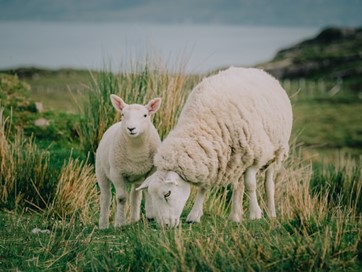The manner in which animals are raised for food has significant ethical implications, influencing animal welfare, the environment, and local communities. When it comes to lamb production, pasture-raised practices are gaining attention for their humane approach and reduced environmental impact. Superior Farms in Denver explores the ethical considerations involved in raising lamb, focusing on why pasture-raised methods matter, and how they contribute to a more compassionate and sustainable food system.
What Does It Mean to Be Pasture-Raised?
Pasture-raised refers to livestock that spends a significant portion of its life grazing on open pastures rather than being confined to feedlots or enclosed spaces. For lamb, this means they have access to fresh grass, ample space to roam, and a more natural environment. This approach contrasts with conventional meat production, where animals are often kept in confined conditions and fed a diet primarily consisting of grains.
Animal Welfare and Humane Treatment
One of the most critical ethical considerations in raising lamb is animal welfare. Pasture-raised practices offer several benefits in this regard:
- Natural Behavior: Pasture-raised lambs can exhibit natural behaviors such as grazing, running, and socializing with other animals. This leads to a healthier and less stressful life.
- Reduced Confinement: Lambs raised on pasture are not confined to small spaces, reducing the risk of stress, aggression, and injury commonly associated with overcrowding.
- Lower Use of Antibiotics: In conventional settings, the close quarters of feedlots can lead to a higher risk of disease, prompting the use of antibiotics. Pasture-raised lambs, with more space and cleaner environments, typically require fewer antibiotics, promoting better animal health.
By allowing lambs to live in a more natural setting, pasture-raised practices align with the principles of humane treatment, fostering a higher quality of life for the animals.
Environmental Impact
Another ethical consideration in lamb production is the impact on the environment. Pasture-raised lamb has several advantages over conventional practices:
Improved Soil Health: Pasture-raised lambs contribute to soil health through natural grazing, which helps maintain a balanced ecosystem. Their manure provides natural fertilization, reducing the need for synthetic fertilizers.
Reduced Carbon Footprint: Pasture-raised systems often rely less on gas-powered vehicles and other machinery, leading to a lower carbon footprint compared to industrialized feedlots.
Biodiversity: Pasture-based systems can support greater biodiversity, providing habitats for various plants and wildlife. This contributes to a more sustainable and resilient ecosystem.
By embracing pasture-raised practices, farmers can promote environmental sustainability while reducing the ecological impact associated with conventional animal agriculture.

Impact on Local Communities
The way lamb is raised also affects local communities. Pasture-raised lamb has a positive impact in several ways:
- Supporting Local Farmers: Pasture-raised meat production often involves smaller, family-owned farms. By supporting these farms, consumers contribute to local economies and encourage sustainable agriculture practices.
- Reduced Environmental Degradation: Industrial farming can lead to environmental degradation, affecting local communities with issues such as soil erosion and water contamination. Pasture-raised practices help mitigate these risks, promoting a healthier environment for local residents.
- Building Stronger Connections: Pasture-raised lamb production can foster a closer connection between farmers and consumers. This can lead to greater transparency and trust in the food supply chain, as consumers know where their food comes from and how it is produced.
The Case for Pasture-Raised Lamb
Choosing pasture-raised lamb aligns with ethical considerations around animal welfare, environmental sustainability, and community impact. By supporting these practices, consumers can play a role in encouraging more humane and sustainable food production systems.
While pasture-raised lamb may come at a higher price point due to the increased space and resources required, the benefits in terms of animal welfare and environmental impact often justify the cost. Ultimately, by choosing ethically raised lamb, consumers contribute to a more compassionate and responsible food system, benefiting animals, the environment, and local communities.

